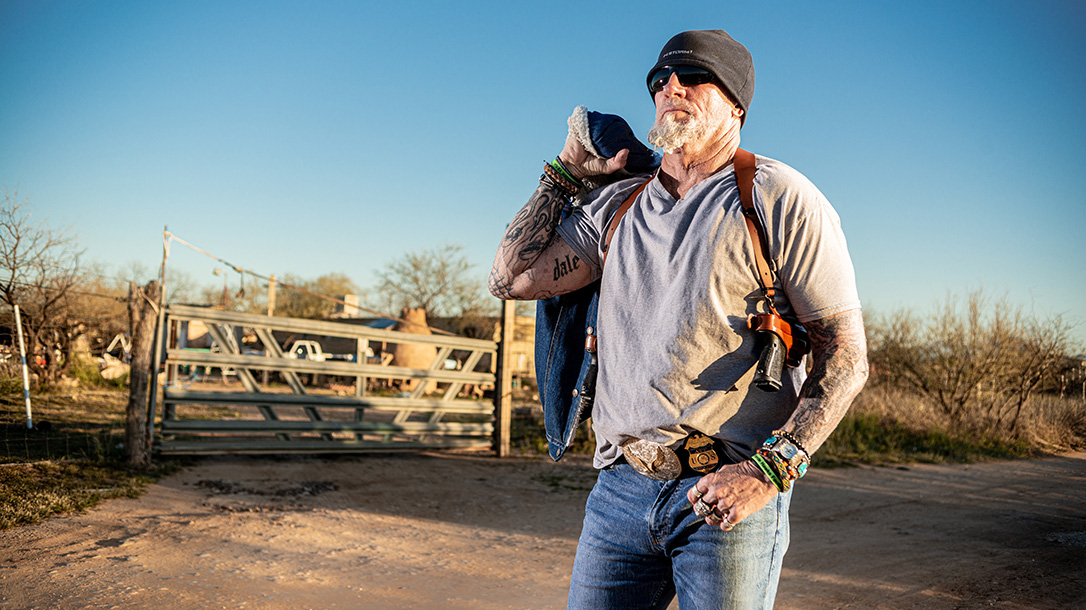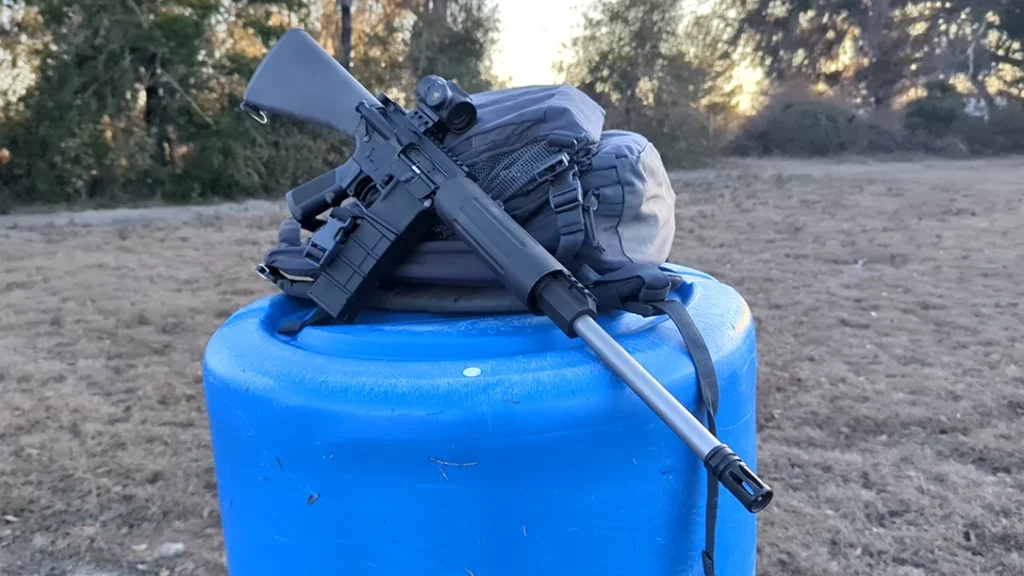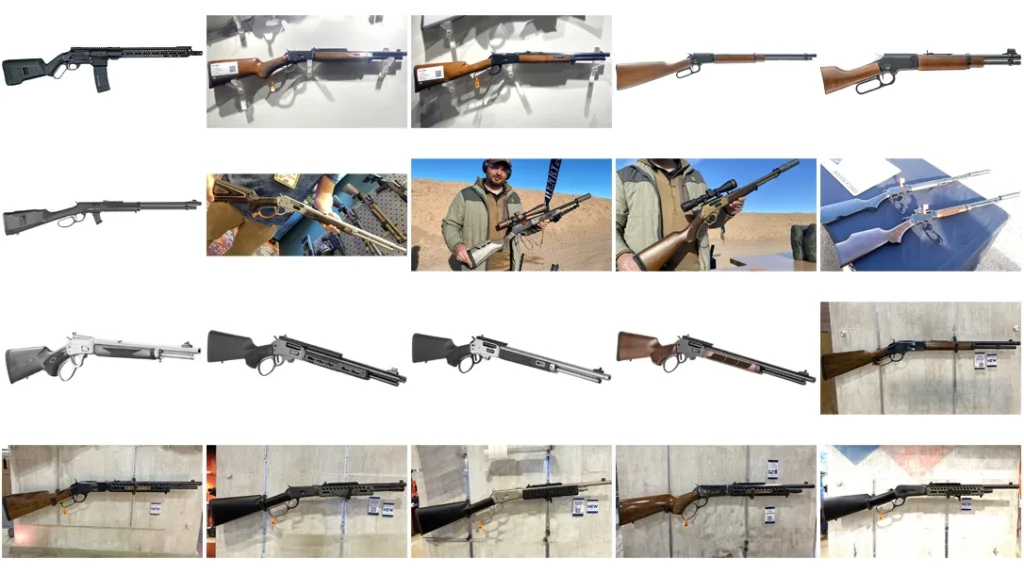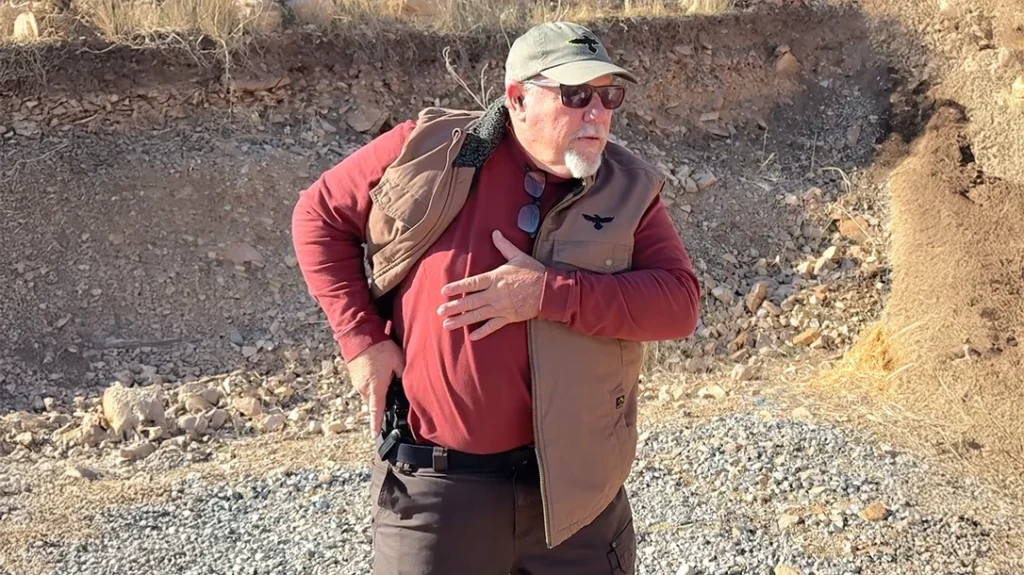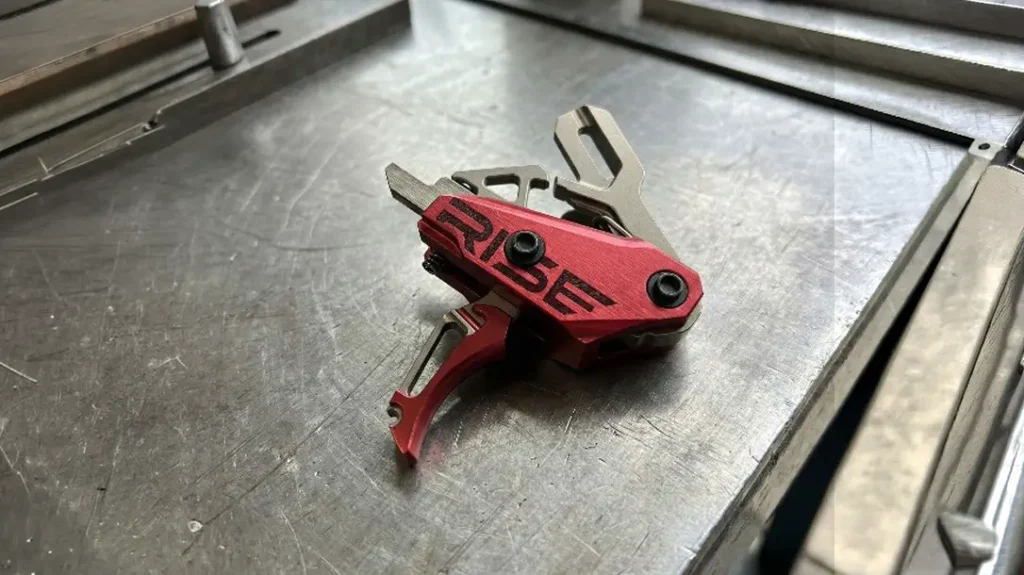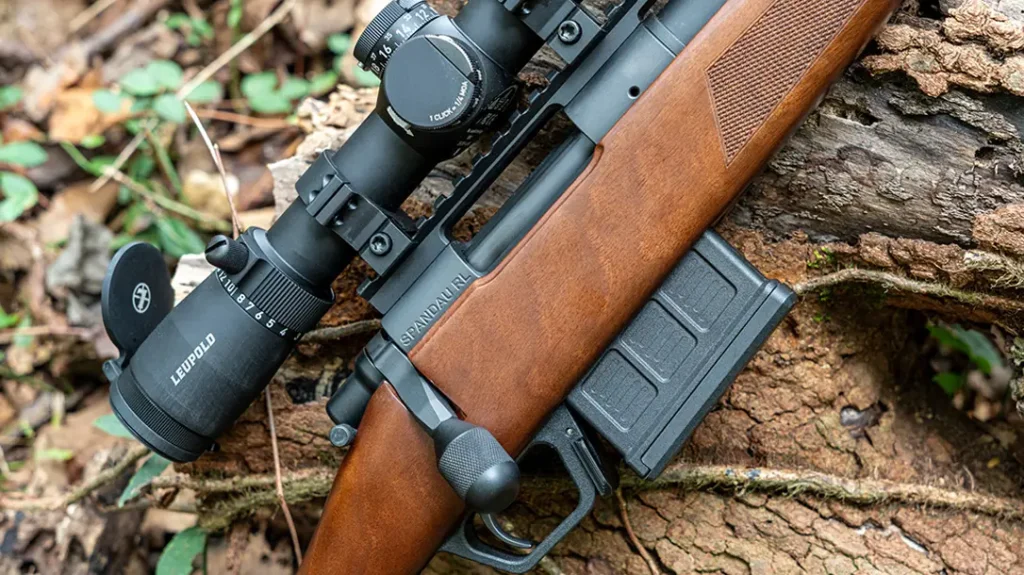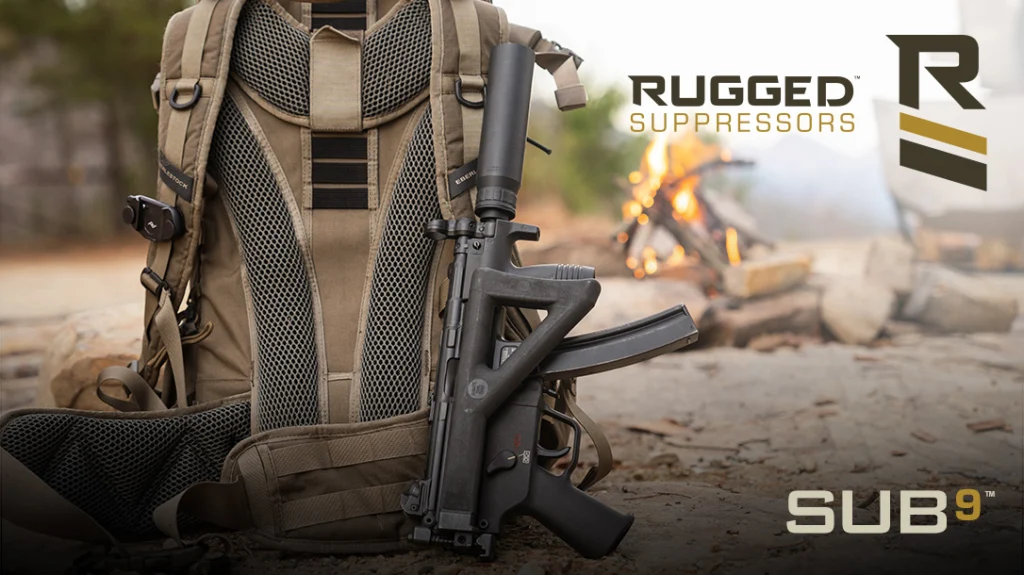Jay Dobyns is a 27-year veteran undercover agent of the Bureau of Alcohol, Tobacco, Firearms and Explosives (BATFE). His career includes being shot his first week of work, before even attending the academy, and again before he celebrated his second work anniversary. His most documented exploit was becoming the first federal undercover agent to be patched into the Hells Angels. Operation Black Biscuit, a two-year investigation, accounted for 55 biker arrests. But it didn’t come without great personal cost.
The Story of Jay Dobyns
Betrayed by the very agency he risked everything for, Dobyns was targeted for death by those he investigated, with his BATFE supervisors acting as willing accomplices. This same corrupt leadership also brought us the infamous Operations Wide Receiver and Fast and Furious. Special Agent Dobyns decided to take a stand and refused to be silent. His daring expose of the BATFE’s immoral and unethical management brought the full weight of the government’s resources down on him.
Dobyns’ story is one of great strength, perseverance, dogged determination and sacrifice. To tell it, I traveled with Dobyns to the site of his first shooting, and we spent an afternoon recounting his career.
Advertisement — Continue Reading Below
Let’s start with a rundown of your awards and citations.
Well, I really don’t take myself very seriously. I can tell you where they’re all at—the landfill. Every frickin’ thing I ever got from the BATFE is in the landfill, with the exception of three that I felt were hard-earned. I got two Gold Star awards that are awarded for injuries received in the line of duty. I held onto those two for my kids. I also received the Eddie Benitez Fitness Award when I went through the academy after being shot. You know I got the DOJ’s Medal of Valor, and it was presented to me by James Comey. In 2004, James Comey was very well received, very much loved in the law enforcement community—he was this up-and-coming star. But when I see how he conducts himself now, the DOJ Medal of Valor has lost its luster for me and doesn’t mean anything. In the end, the trophies and plaques and awards that are in the landfill—I realized that my motivation was very unimportant to the people I worked for and that was heartbreaking. It was soul crushing.
After a standout career in college football at the University of Arizona, you played some pro ball?
You know, I was a great high school player, I was a good college player and I was a terrible pro, to be quite honest. I’m a person who never had a Plan B. I always had a Plan A but never had an escape route or a backup plan in case it didn’t work out. My Plan A was to play pro football, and through college I became pretty full of myself. It turned out I wasn’t as good as I thought I was. When football fell apart for me, I was like, what now? I realized that, at best, I was always going to be a guy struggling to stay on a roster somewhere. I always played with teammates who were bigger, faster, stronger athletes, but I was able to stay competitive in that environment because I outworked them, I was tough, and I played recklessly.
So why the BATFE instead of the DEA, FBI or any other agency?
I wanted to work at the BATFE because they had the most dynamic undercover program in the federal government. And I knew that’s what I wanted to do. At the time I was trying to figure out what to do, Miami Vice was very popular. Sonny Crockett’s running around South Beach, and he’s got a Hugo Boss suit on, and he’s driving a Lamborghini. He’s going to mansions, meeting slick kingpins, and he’s negotiating for a ton of cocaine on a barge in Miami harbor on its way from Colombia. There were cigarette boats, Learjets and strippers, and I was like, “Oh man, I think I could do that!”
Advertisement — Continue Reading Below
In 1987, the BATFE was only 15 years old. I became an agent when it was still under the Treasury Department. They were finding people who were seasoned investigators, detectives and street cops at the state and local levels. The BATFE was always considered the federal version of street cops. I wanted to learn the job from them. These guys weren’t interested in the wiretap-type cases—they wanted to build proactive, down-in-the-weeds, get-your-hands-dirty cases.
Tell us about your first week.

I got hired by the BATFE, sworn in and did my paperwork on a Monday and got shot on Thursday. This was before I had even been to the academy, so they gave me a vest and a loaner gun. I’d never even held a gun before, much less fired one. I was part of an arrest operation south of the Tucson airport, in a neighborhood off Old Nogales Highway called Dogpatch. It’s all dilapidated trailers, and there are a lot of good, hard-working families down there. But it’s a rough area.
Advertisement — Continue Reading Below
So, this cat shows up and we start closing in on him, and he goes on the run. I wasn’t fast enough to play in the NFL, but I was faster than a bunch of old federal agents. We chased the guy and lost him. At that point, I took off my vest. Rookie mistake! He had hidden in some deep grass, and as I walked past him, the dude popped up and put the gun to my head. It was surreal! Then he started walking me, with the gun to my head, to our arrest vehicle. He pushed me into the front seat of this two-door car, and he hopped in the back, all while screaming, “Get me out of here! C’mon, let’s go! Let’s go!”
My first thought was to throw on my seat belt and ram the motherf*cking telephone pole in front of us. But, on second thought, I might’ve ended up crushed and shot. The keys were hanging in the ignition of the car, and I took them out and dropped them on the floorboard. I told him I dropped the keys and leaned forward, and when I did, his gun came off my head and to my back. Then, the agents coming in around the car opened up, and he fired a round that hit me.
Maybe 20 rounds were fired in that 10-second gunfight. The suspect was killed, but his round hit me between my shoulder blade and spine. It went through my lung, narrowly missed my heart on the left side and exited my chest. I got the door open and fell out onto dog turds. I’m lying there in the dirt, and a puddle of blood is starting to grow. I tried to move, and something happened and blood started squirting out of my chest, like when you put your thumb over a garden hose. All I could think was, “I’m gonna f*cking die in this dog shit!”
Advertisement — Continue Reading Below
They scooped me up and took me to Kino Community Hospital. The docs were like, “We’re not built for this—we don’t do Level One trauma care.” They ultimately stabilized me and put a chest tube in my side because I had a sucking chest wound. I was in and out of consciousness and hyperventilating off one lung. I looked up at a nurse and asked, “Am I gonna die?” And I just remember her looking down at me and saying, “We’re not sure yet, baby.” I was just 26 years old!
How long was your recovery after being shot?
Well, I was young and in amazing shape. I was fresh off the football field, so my recovery was really, really quick. I was off the job maybe six weeks. The shooting took place on Nov. 19, 1987, and I showed back up to work before Christmas that year. My boss said, “What are you doing here?” I told him I was good and ready to go back to work. He was angry and told me I still had three months of medical leave coming to me. I just wanted to get back to work.
I had attorneys begging me to sue the government for being placed in that position without training. They were guaranteeing millions of dollars. Money was never a factor for me. I just wanted to be an agent and see if I could do right the next time.
Advertisement — Continue Reading Below
Then you went to the Federal Law Enforcement Training Center (FLETC) in Georgia?
I was shot in November and was at FLETC in early spring of 1988. I loved, loved, loved being at the academy. Not one bad memory. Not one bad thing to say about anyone involved in the process—it was wonderful! When I got to the academy, I knew I had made the right choice. I was like, “God this is so cool!” I’m glad I made the decision to be where I’m at.
I was actually in the academy when the NFL went on strike. I got a call from the Dallas Cowboys, and they offered me a professional football contract. “Here’s your ticket, fly to Dallas and you will be playing football for the Dallas Cowboys this Sunday in Texas Stadium.” I’m in my FLETC gear, on a payphone in the hallway of the dorm, thinking, “Hey, your Plan A is still there, dude!” But I knew the strike wasn’t going to last forever. Did I want to trade a couple weeks or months or a season of my dream to play professional football for a life and a career of what I really enjoyed doing? I was like, “Thank you, I’m going to stay where I’m at. I’m content with where I’m at.” I’d found a new home and had a new Plan A.
After graduating, Tucson was out of the picture if you wanted to go back undercover, right? What happened next?
I got transferred to Chicago and was shot in August of 1989. We were doing a machine gun deal with some Vice Lord gang members in Joliet. In other words, we were selling the government’s machine guns to Vice Lord gangbangers. We made the transfer, and then our surveillance was going to follow our guns to where these kids—these were just kids, and I regret that—took them. We wanted to get to the shot callers, to climb the ladder. For lack of a better term, this was a mini Fast and Furious. The big difference was there was no way we were going to let those machine guns walk. At that time, it was inconceivable to let the guns walk. Twenty years later, someone thought it would be a good idea to do that.
Advertisement — Continue Reading Below
Our surveillance followed the load around, but the kids had been trained and were smart—they weren’t just going to drive to JoJo’s house and unload the guns. So, they started running. There was panic—what if these kids get away with our machine guns? The surveillance team didn’t have an airplane up, so they were just trying to follow them. Me and my undercover partner weren’t part of the surveillance, but we actually found ourselves in a position to block these kids. Police cars were chasing them from behind, and we’re blocking them from the front, and me and my partner got out of the car. When I moved to the side of the road, I heard their car start to accelerate. One of the bangers leaned out the passenger side of the car and started shooting at me. Pressed up against the edge of this cornfield, I fired back. During this gun exchange, the car closed in on me and clipped me. I hit the windshield and flipped off the top of the car and landed in the dirt still firing.
Did you realize you’d been shot?
One leg was like completely incapacitated. The impact even blew my shoes off. I was sitting in the dirt with no shoes on, thinking “How the f*ck did that happen?” I couldn’t get up, I couldn’t walk, and a kid came over on a bicycle and picked one of my shoes off a cornstalk. He was like, “Hey mister, here’s your shoe.” Ultimately, they found the jacket of a bullet in my vest. It was in between the vest and the actual Kevlar. They said, “Dude, you got shot,” and I said, “You know what, if it didn’t make an extra hole, it didn’t count!”
I don’t say this in an arrogant or bragging way, but at the time, I felt empowered—I was friggin’ bulletproof! I was invincible. I’d had a bullet go through my chest at point blank, and I came back and won the fitness award at the academy. It didn’t break my spirit. I wanted to work undercover, so I was transferred to Chicago, where I was shot again and run over. I was like, “Man I love this! It’s what I want to do!” I had brainwashed myself into thinking I was the baddest cat on the streets.
Advertisement — Continue Reading Below
Let’s fast-forward 15 years, after you’ve handled a number of firearms and explosives deals. How did Operation Black Biscuit come about? Why infiltrate the Hells Angels?

The Hells Angels had been operating with impunity out west, and the Arizona Hells Angels were especially brazen. They were aggressive, violent and unchecked. The case agent, a guy named Joe Slatella, approached me and said, “I wanna make a run at these guys. I want you to lead the undercover portion of this case.” We had guys who were outlaw motorcycle gang experts. I wasn’t—that was not my gig. My cover, or the role I played, was a kind of thuggish, white trash, trailer-park hitman. And I recycled that role for years and years and just always played that vibe. I had 15 years of undercover experience behind me, but I wasn’t a biker investigator.
“Slats” was relentless. I didn’t know if I could play a biker, but this also wasn’t JoJo’s Biker Club. This was the world’s most notorious outlaw biker gang. I trusted Slats with my life, and he believed in me. So we extorted and intimidated and leveraged our way into an outlaw biker gang that was based in Mexico called the Solo Angels. We used the Solo Angels and wore their patch to have credibility in the eyes of the Hells Angels.
Advertisement — Continue Reading Below
We were independent of the Hells Angels, but we were making friends and gaining trust but staying at arm’s length. Things were going well until a Solo Angel out of Tijuana got in touch with a very violent faction of the Hells Angels in Phoenix led by Chico Mora. Chico was arguably the most wicked, vicious, violent and unstable Hells Angel of all time, and I’ve met hundreds of these dudes. He had manslaughter convictions that he had served time for. While he was locked up, he became the Arizona state prison boxing champion. He was bipolar, he was a drug addict. Other Hells Angels told me, “Stay away from that f*cker. He’ll beat the piss out of his own mother!” He carried a bullwhip with him and beat people with it. A bullwhip!
Anyway, Chico gets this information from the Solo Angels that the Arizona Solos, who had leveraged our way in, were counterfeit. The Solos told Chico, “These guys extorted their way into our club and basically bought their patches. Once they got patched, we never saw them again. They’re not in touch with us.” That was an error on my part. In hindsight, we should have continued to develop that relationship.
So, Chico took it on himself, and he teamed up with another wild Hells Angel named Dan Danza. Along with Hells Angel Rodney Cox and yet another named Doug Wistrom, Chico put together an assassination team. They were coming to kill the Arizona Solos. The DEA had an informant that was next to Chico but did not know that we were working undercover. The informant called his handler and said, “I don’t know what’s going on, but Chico just rounded up three guys, and they’re on the way to go kill the Solo Angels.” The DEA agent called Slats and said, “I don’t know where your boys are at, but you better friggin’ let them know Chico is coming for them.”
I was at the undercover house with my crew when Slats called and said, “You need to get the f*ck out. I don’t have time to talk about this now, but get the f*ck out of the house.” There was panic in Joe’s voice, and he never panicked—he was normally like ice water. So, we left, and they set up surveillance on our undercover house. Sure enough, four Hells Angels showed up with baseball bats and sawed-off shotguns.
So, we assumed our investigation was done. This was unrecoverable—we were outed. They knew the Solo Angels were counterfeit. I told Joe, “Let me take one last run at this and see if I can save it.” I decided to go to the Hells Angels president in Mesa, “Bad Bob” Johnson, who I’d become very close to. Bob invited me out to this tavern. Slats said it was a setup, but I said, “I can save this! I can save the case. Let me talk to Bad Bob!”
Everyone was convinced this meeting with Bob was an assassination setup. I got to Bob, and he was like, “This is what I’m hearing, and I am pissed because I’ve been f*cking vouching for you. I’ve been hanging out with you, doing gun deals with you and drug deals with you. You look me in the eye and tell me you’re not a f*cking cop!”
I said, “Bob, you need to pump the brakes. Think about all the things we’ve done together and how long we’ve done them.” And I went through my history with him, my friendship and all the drug and gun deals, and parties and stuff. I said, “I’m sorry, and I don’t want to create a conflict with you, but your boys are wrong. Your boys have it wrong—they have bad information. You know it’s wrong because you know me.” He thought about it, then he called Chico and told him, “Call this off, right the f*ck now.”
Right then I knew we weren’t done, and we knew the case was saved because arguably the most powerful Hells Angel west of the Mississippi had just vouched for me. He took my word over those of his brothers, some of whom he’d known for over 30 years. But then the other shoe dropped. Bob said, “I just stayed your execution, but now you’re with us. You’re all in. You guys are coming over to the Hells Angels. And if you choose not to, that’s fine, but I don’t ever want to see your face in Arizona again. You either come with us and become Hells Angels or you get the f*ck out.”
Now we were part of their gang, but with this black cloud hanging over our heads. The dynamic really changed. We were trying to engage in compromising conversations, conduct our investigation, with this suspicion on us. We ultimately overcame the doubts and were able to gather much more information because we were inside the wire.
What was the toughest part of the operation?
Operation Black Biscuit ran just short of two years. Those were definitely the longest two years of my life with 18- to 20-hour days—day in and out. It’s super hard to be a Hells Angel. They live hard, fast, unhealthy and dangerous lives. It’s even harder to be a Hells Angel when you’re an undercover cop. You have to live the Hells Angel life within their beginning and end of day. But as an undercover, before your Hells Angel day begins, your day begins with your team. Your briefing, your plans for the day, who you intend to meet, where you intend to go and what you hope to accomplish. Then, when your Hells Angel day ends, your day as a cop resumes. You have to transcribe tapes, write reports, process evidence, debrief, plan for tomorrow. I was working off four hours of sleep a night, under life-and-death stress, for two years. I was wiped out.
There are things you simply can’t do, as a federal agent, that were part of the world of the Hells Angels. So, on these extended days when guys were sucking up coke and meth and powering through the day with high energy, I couldn’t do that! But I had to keep up with them.
It started out with drinking Red Bull and hitting Starbucks and ultimately turned into six Red Bulls a day and three packs of friggin’ Marlboros. I was smoking cigarettes as fast as I could light them. But it just wasn’t enough—it wasn’t working. So, I started taking diet pills. Back then you could buy them over the counter, and they had ephedra in them. I think on the bottle it said not to exceed two or three a day. Shit, by the time the case ended, I was eating 20 diet pills a day just to keep going. I was constantly racing.
I woke up one night, and it felt like my heart was exploding. It was racing so fast that when I took my pulse, it felt like one heartbeat. I drove myself to the hospital in Tempe and sat in the emergency room parking lot waiting to calm down or die.
After the operation was complete and I stopped taking the diet pills, my physical health bounced back, but my mental and emotional health was destroyed. My spiritual health was destroyed.
Let’s talk about the results. How many arrests were there?
There were 55 arrests, and 16 of those charges were on RICO [under the Racketeer Influenced and Corrupt Organizations Act]. Two defendants were arrested on murder charges and became death-penalty candidates. They had murdered a woman and tried to cut her head off in Apache Junction. So, the case concluded, and we were pretty satisfied with what we accomplished. But the prosecutors and the BATFE could not agree on how to move forward with the prosecution, specifically around discovery issues and what the BATFE did and didn’t want to release. Slats had informants’ lives on the line, and he wasn’t willing to sacrifice them for convictions. The prosecution was disrupted, and the BATFE and DOJ were very willing to just let the blame lay at the feet of the undercover agents when they knew that wasn’t true. Cases were dismissed and righteous felony cases plea-bargained to misdemeanors, and some carried little or no jail time.
Was it worthwhile?

You know, it was two years of blood, sweat and tears. It was two years of extended periods of time away from my family, and my kids were little. I put massive amounts of battle damage on my family in the process. If someone asked me, “Would I do it again?” the answer is yes, but I would do it better. In hindsight, I wouldn’t make some of the mistakes I made, and I would have taken better care of my family.
One of the regrets I have is that during this case, this role I had as “Jaybird Davis” evolved from what I did to who I was. I was in it for so long, and it was so intense and full-time, that instead of it being what I did for a living, it became who I was. Jaybird Davis started coming home, and he wasn’t treating his wife and kids very well. I was a bad husband and a bad father, and I inflicted damage on my family.
And then you became a target of the BATFE? Why?
My true identity was revealed very early in the prosecution, and that’s when the death threats started coming. The Hells Angels held a death contract on me. They farmed out a contract to the Aryan Brotherhood and another out to the MS-13. They farmed one out to the 18th Street Gang in Los Angeles through prison connections. So, I was kind of like, it’s the cost of doing business. But then the threats started surfacing on my family. There were threats to kidnap and torture my daughter, who was a teenager at the time. I actually ran into a Hells Angel on the street—one of our targets—and we had a confrontation. He told me, “We know where your son goes to school. Oh, you’re shocked by that? We know where you live. We’ve followed him. Someday you’re going to be waiting for your little boy to get off the bus, and I know you love your little boy, and when he doesn’t get off the bus, you’ll know he’s with me, and you can think about what I’m doing to him.”
No one at the BATFE with the influence to address this did anything—no one cared. I went to my BATFE bosses and said, “You have an obligation to investigate this.” They said, “You’re on your own, dude. We can’t help you. This is too big for us to contain. Where do you want us to start? With the Hells Angels? They are on every continent—there’s 7,000 members worldwide. How about the Aryan Brotherhood? Should we start knocking on prison cells? And MS-13—should we go down to San Salvador? Should we start there or in Los Angeles? No, you’re on your own to figure this out. We can’t help you.”
One boss said, “Look, I’m really sorry this is happening to you. Tell your family to maintain a heightened sense of awareness, but you need to understand something: You did this to you. No one held a gun to your head and made you take this case. So, if these bad things are happening to you, you did it to yourself. It’s not our problem.”
I realized the hard way that these people I worked for, sacrificed for and had taken risks for cared nothing about me. Nothing! I had become a stale French fry in the bottom of their Happy Meal bag. Something I learned through this process is 90 percent of the world doesn’t care about your problems, and the other 10 percent is happy you have them.
I knew they weren’t going to investigate this. So, I wrote my first book, No Angel. The only resource I had was my story. I decided to hide in plain sight, and the BATFE sued me. They were like, “We didn’t give you permission to write this.” I said, “You told me that I was on my own. You told me this was my problem to resolve.”
Then I filed a complaint. The OSC [Office of Special Counsel] and OIG [Office of Inspector General] investigate it and independently confirmed everything I said. Horowitz wrote his report and confirmed everything, they sent it on to President Obama, who sent it to Eric Holder, then to Congress, who sent it to the BATFE. Nothing happened. I was like, “How can something this catastrophic not become a blip on the radar?” It made no sense to me. Something bigger was brewing. I just had no way of knowing what that was.
The BATFE was pissed because I had taken this story out of the house. I was hanging out their dirty laundry. Newell and Gillett and Higman—the same BATFE agents who orchestrated Operations Wide Receiver and Fast and Furious—and some other people conspired to unmask all of my undercover documents. My vehicles, license plates and registration, home and tax records, voter registration, utilities—everything becomes open-source information that had been previously listed under different names and false locations. The BATFE intentionally unmasked all of those documents as payback for me complaining that they did nothing about the threats. Three months after that, in August of 2008, my house burned to the ground at 3 o’clock in the morning when I was out of town. Thankfully, my wife and kids were able to escape, and it was ruled an arson.
I’ve always been a silver-lining kind of guy. I always look for something good in something bad. Investigators came out and said it was a failed assassination attempt. One said, “If your son didn’t wake up when he did, your family would’ve died in that fire.” I thought, “Finally, they’re going to have to do something. They can’t run from this anymore, and it can’t get any worse.”
But then they doubled down. Holder and the corrupt BATFE bosses in Phoenix built a task force and tried to frame me as the arsonist, someone willing to burn down his own house with his family inside. They fabricated evidence, conducted illegal surveillances, and filed false reports. They did everything in their power to frame me. Many knew, but no one cared. I said to myself, “Why am I the only person bothered by this?” And then Border Patrolman Brian Terry was killed.
It started leaking that the guns used in Brian Terry’s murder had come through a BATFE investigation. More information came out that there were more guns in Mexico. ICE Agent Jaime Zapata was murdered with another Fast and Furious gun. Guns had been “walked” to the cartels through Operation Fast and Furious, and now they had a hand in the murder of Border Patrol and ICE agents. That’s when it all made sense. The people that were ignoring the threats against me, the people who tried to frame me, were the same exact people who were running Operation Fast and Furious. Nothing was done because they didn’t want to disrupt the operation. They couldn’t take those people out of play. There was something so much bigger going on than Jay Dobyns and the threats against him and his family. Something much, much bigger and important to them. They’d do anything to keep that alive, including destroying me.
Why take on Goliath?
The things that happened to me have happened before, but those people never spoke up—they absorbed it. They took it. They went away or hid long enough to make a comeback; that empowers those who do the bad acts or treat others the way they treated me. The problem is, they did it to Jay Dobyns—they picked the wrong cat to f*ck with! That was their error. I said, “The buck is going to stop with me. I’m not going to take this. I am probably going to get my ass beat in the process. You’ll probably ruin me, my finances, you’ll ruin me professionally and my reputation, and you’ll suck every friggin’ ounce of life out of me. But, guess what? I’m going to win or die trying.”
After they tried to frame me for the house burning down, I had enough of the internal complaints, right? Because I saw what happens with internal complaints—nothing. So, I filed a lawsuit. In the pretrial conference, a DOJ attorney said, “Jay, you’re gonna win at trial, and we know what the evidence is. But you need to understand something: We will never let you win. We will appeal this, and we will fight this forever. We have literally thousands of attorneys, billions of dollars and unlimited resources. Do you? Can you keep up with us?” That might have been the one honest statement the DOJ made in the process.
They knew they were going to out-resource me. Which is exactly what they have done and what they are trying to do. I won the trial, but the DOJ appealed, and my victory was overturned based on a technicality—not on facts or evidence, but on a technical interpretation of employee contract law. The appellate court left all of the facts and evidence in place. In effect, they said, “What happened to you is unfortunate, but there is no law that says an agency can’t treat an agent like that.”
My appeal to the U.S. Supreme Court was denied in February of 2020. Sixteen years after it all started, it was finally over. I had lost. I failed in my attempt to create change.
What keeps you going?
My family. I know that if I didn’t push this thing through until the end, I’d be a counterfeit in the eyes of my wife and children. My family suffered as much or more than I did. They never quit on me. I gave them a million reasons to bail out on me, but they gave me a million-and-one second chances.
Through this process, I’ve become very spiritual. There was a point in time where I felt like God had lost my phone number. Everything that could go wrong was going wrong. Then I realized God didn’t lose my number—he was calling me. I was able to turn everything that happened into something positive. The things I felt that were so unfair and undeserved, I’ve turned into training, books, a podcast, my coaching. I think God put me through those things, or allowed me the free will to go there, not because he lost my phone number, but because he had something else in mind for me, something better, hopefully.
Tell us about your books and podcast.
No Angel is kind of a case study of my infiltration of the Hells Angels. I wrote No Angel almost in a panic to defend myself. I was out of resources, and my family and I were receiving death threats. I was in a hurry to have my story known. Catching Hell is a bigger picture of my career. I self-published this book because some of the larger publishing houses were nervous that I used real names and thought the content might invite some unwanted lawsuits. But I was like, “You know what, I can validate every claim made in that book, and they can kiss my ass. Hey, I’m sorry if you’re not painted in a flattering way, but you earned it!” I didn’t soft-sell anything. I didn’t write it for payback, either. I wrote it for my kids, to document the truth and maybe, someday, have them better understand me.
My podcast is called Copland. I produce it from top to bottom as a one-man show. It’s raw, indie style. I find the guest and prepare, conduct and edit the interview. I write and record the narrative copy. I mix it, then publish it. I have no sponsorships, no money, no endorsements, nothing. It’s just me, and I do it as my gift back to my profession. I do it as a favor to first responders to share some of the amazing people I’ve met and their stories, in their words. Wherever you listen to podcasts, you can find Copland.
If someone wanted to contact you about speaking to a group, how would they find you?
My website is jaydobyns.com.
This article is an extended version of the one found in the June/July 2020 issue of Ballistic Magazine. Check out our current subscription offer at OutdoorGroupStore.com.
